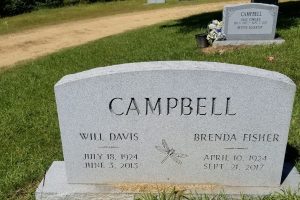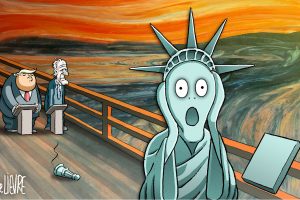 I lost my soul. At least that is how I felt. It’s the best way I know to describe what was for me a living hell on earth as I battled the beast of depression. St. John of the Cross spoke of the “dark night of the soul.” Martin Luther called it anfechtung, a German word with no English equivalent. Luther’s biographer, Roland H. Bainton, attempted to define anfechtung as “all the doubt, turmoil, pang, tremor, panic, despair, desolation and desperation which invade the spirit of [humankind].”
I lost my soul. At least that is how I felt. It’s the best way I know to describe what was for me a living hell on earth as I battled the beast of depression. St. John of the Cross spoke of the “dark night of the soul.” Martin Luther called it anfechtung, a German word with no English equivalent. Luther’s biographer, Roland H. Bainton, attempted to define anfechtung as “all the doubt, turmoil, pang, tremor, panic, despair, desolation and desperation which invade the spirit of [humankind].”
In his Divine Comedy, Dante Alighieri had these words written on the gate of the entrance into hell: “All hope abandon, ye who enter here.” For the severely mentally ill, hopelessness is life on a daily basis. A literal hell on earth weighs every moment upon the afflicted. There is no hope. There is no light. Nihilism reigns.
This is what I experienced. Depression stole my soul and buried it so deeply that (with apologies to the Apostle Paul) for me, to live was not Christ at all, but to die most assuredly would have been gain. (I am aware that mental illness comes in many forms and varying degrees of severity; this article focuses on my personal battle with depression and anxiety.)
The Descent
I have been a Baptist pastor for more than 35 years. I have battled depression and anxiety for about 18 of those. During that time, I had two children at home. They wanted to play with daddy, but as much as I wanted to, I could not oblige. I did not have the physical energy or the emotional strength to deal with their young exuberance.
“Every day I pleaded with God to take away my darkness.”
I began to cloister myself from my family and my church. All my energy and motivation were gone. Early to bed and late to rise became my sleeping pattern. An empty shell does not even begin to describe the nothingness inside me.
I prayed a lot. I took walks in our neighborhood and prayed. I sat in my office and prayed. I prayed in the sanctuary, the car and on the back porch. I did, indeed, pray without ceasing. I read my Bible and devotionals every day. Every day I pleaded with God to take away my darkness.
God did not.
In the mid-1990s, my doctor offered to prescribe an antidepressant. I refused, not out of denial but out of ignorance. I did not understand what I was fighting. I naively assumed that it was a spiritual or emotional problem that prayer and will power would conquer.
I was wrong. And in 2003 the bottom fell out.
I arrived at my church office on a beautiful spring morning in May. The warm sun was shining. Flowers were blooming, trees were budding and birds were singing. It was a perfectly delightful morning. I was the first one at church. All was quiet and peaceful.
Suddenly, for no perceivable reason, I felt a physical panic begin to well up inside me. My entire body felt like it was on fire. Afraid to drive home and too physically and emotionally paralyzed to move, I called my wife to come get me. “Hurry, please!” I kept repeating to myself. “What’s taking her so long?”
If ever anyone had a nervous breakdown, I was having one. Heart racing. Hyperventilating. Panic. Darkness descending. What if I pass out? Could I be having a heart attack? My God, my God, why have you forsaken me? All is lost!
I was soon under the care of a psychiatrist who placed me on medications for both depression and anxiety. They worked for a while.
Then came 2005. My medications had become increasingly ineffective. By July I realized, as did the church I was serving, that I could no longer carry on my duties as pastor. I resigned my position and went on disability. My future and that of my family was now a complete unknown. Would I recover? Would I ever again be able to care for my family? Would we lose our home? Would I decide to continue to live?
The Ascent
In October of that year, I had nine Electro Convulsive Treatments (ECTs) over a period of 18 days. The treatments were successful, and by February I felt better than I had in years. I also began (and continue to this day) to take medications to help ensure a relapse does not occur. After spending 14 months on disability, I sent my résumé out, hoping to return to the pastorate.
“When it comes to mental illness, many evangelical Christians have missed the boat.”
As I searched for a new pastoral position, I chose to be honest about my experience with depression. But my story scared off most churches, as well as some directors of missions who refused to even share my name with churches in their areas. I was disappointed by many people.
But God was at work. God opened the door to the church where my wife and I serve today. (She is our minister of music.) We landed squarely in the arms of a loving church that was just right for us, and we for them.
My heart, soul and mind are mine again. Mental illness is not omnipotent. Recovery is possible. Healing can and often does occur, and to have the dawn break into the darkness of one’s soul is a kind of salvation unto itself.
Missing the boat
When it comes to mental illness, many evangelical Christians have missed the boat. Mark Noll’s 1994 The Scandal of the Evangelical Mind begins with this attention-grabbing sentence: “The scandal of the evangelical mind is that there is not much of an evangelical mind.” He goes on to assert that “despite dynamic success at a popular level, modern American evangelicals have failed notably in sustaining serious intellectual life.”
Noll’s premise is easily applied to much evangelical thought and literature related to mental illness.
I have found that almost without exception, the best material available to the general public today is clinical, medical and secular. These knowledgeable writers understand that depression, though there may be many contributing factors, is at its core a physical illness, that it is the result of a chemical imbalance in the brain and that it is as much a physical issue as heart disease, diabetes or cancer. They speak honestly and directly to the necessity of pursuing medical help not as a last resort, but a first step toward treatment. It is rare to find among these authors one who identifies as a distinctly Christian writer – and especially one who is an evangelical believer.
Unfortunately, I have found no writing in the evangelical community that addresses the issue of mental health adequately. From my reading, I believe it is fair to say that while most clinical writers offer a realistic and honest analysis of mental illness, most evangelical material is shallow, trite, uninformed and even harmful.
The evangelical writing I have seen approaches the topic by spiritualizing mental illness while minimizing its horror. There is extensive talk of specifically Christian counseling, attending church, praying and getting involved in “personally meaningful ministries,” while medical treatment is often given only a cursory nod. The underlying message, though usually not overtly stated, seems to be that mental illness is primarily a spiritual rather than a physical matter, and – given enough prayer and faith – God will bring healing.
“Mental illness is not omnipotent. Recovery is possible.”
Though I certainly agree that there is a spiritual element involved, to deny or minimize the chemical issues within the brain that cause diseases such as depression and bi-polar disorder is not only misguided, it is wrong and even dangerous.
Understand, I am not saying that persons experiencing mental illness should not pray, engage a Christian counselor or seek other Christian avenues that might aid in healing. I did this myself. What I am saying is that persons with depression should avail themselves of all possible treatment options. Indeed, perhaps medical treatment is God’s answer to the depressive’s prayer.
Toward healing
If you are trying to cope with depression or other mental illness – or know someone who is – there are some specific steps you can take to seek help and healing.
First, know that you can be made well. There are many treatment options available to you. It is important, like with many other diseases, to diagnose and begin treatment at the earliest stage possible. Had I sought treatment several years earlier, it is likely that my depression could have been managed effectively before it gained its debilitating hold upon my mind, body and soul.
Insist upon seeing a qualified psychiatrist. Nurse practitioners, physicians’ assistants, primary care physicians, internists and psychologists may offer some help, including a referral, but they are not fully trained to treat you. See a psychiatrist and be prepared to describe your symptoms honestly and fully.
If your psychiatrist prescribes medications, take them as instructed. Even when you start feeling better, do not stop. This is often the biggest mistake patients make. Relapse is rampant among persons with depression or other forms of mental illness who discontinue taking their medications after they begin to feel better.
Also, do not feel shame or guilt in seeking medical help. Yours is not a character flaw, moral weakness or spiritual failure. You are not crazy. You are sick.
Mental illness is the result of chemical imbalances in the brain. Fix the brain. Fix the illness. In fact, I would suggest that we jettison the term “mental illness” altogether and replace it with the more accurate “brain disease.” We refer to liver disease, heart disease, kidney disease and lung disease when those organs fail to function properly. Why should we not also have an accurate designation when the brain does not function as it should? When the brain malfunctions we have brain disease, not mental illness. Sometimes people will say to those afflicted with a brain disease, “It’s all in your head.” They are right, just not in the way they mean it.
Another available treatment that is often effective is the use of a professional counselor. This is especially true for persons whose illness is situational and thus likely precipitated by a stress producing event or series of events. In these cases, the therapist can often help the client identify and understand what is causing the problem and through this awareness achieve healing without the use of medications. Typically, these situations are more short-lived and less severe than the chronic diseases discussed thus far.
It is imperative that the counselor be a trained professional such as a certified psychotherapist or Licensed Professional Counselor (LPC). Far too many so-called Christian counselors are certified by second-rate entities. Be careful!
For many, the most effective course of treatment is a combination of counseling and medication. Research has shown that a both/and approach to treatment is often much more efficacious than choosing one to the exclusion of the other.
Persons with a mental illness, or what I would call brain-diseased patients, often share this common experience with Jesus: like him, we also are “sorrowful unto death.” But we are also the recipients of his promise, “I will never leave you nor forsake you.” That is truth, whether at any given moment the sufferer is able to realize it or not.
Even when we feel that hope is lost, there is hope, because we are always held in the loving arms of Jesus.






































































